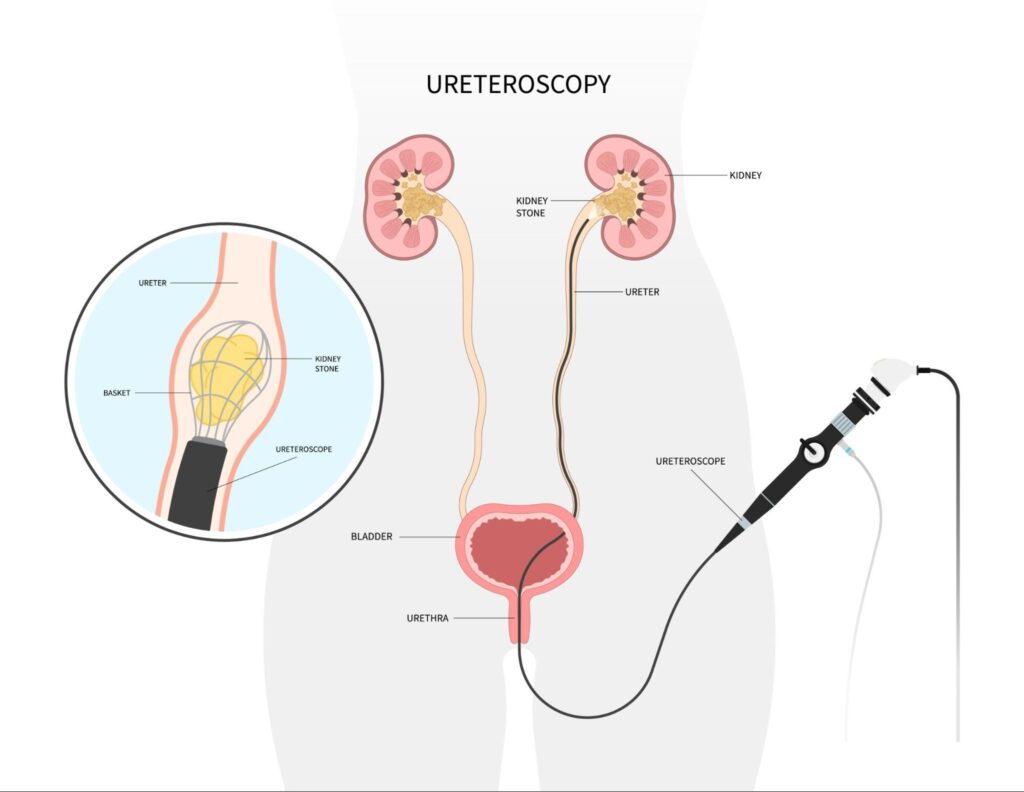Ureteroscopy/Ureterorenoscopy (URS)
Overview
At Indotaj Medical Center in Tajikistan, ureteroscopy is a commonly performed outpatient procedure, primarily utilized for the treatment of stones located in the ureters (the tubes connecting the bladder to the kidneys) or the kidneys. Additionally, it serves as a diagnostic and therapeutic tool for addressing other causes of kidney blockage or the presence of blood in the urine.
Procedure Overview: Ureteroscopy is conducted using an ureteroscope, a slender tube featuring an eyepiece on one end and a small lens with a light on the other. The procedure involves two main approaches for stone treatment:
Small Stone Removal:
- For smaller stones, our healthcare providers employ a ureteroscope equipped with a specialized wire and a small basket.
- The healthcare provider inserts the scope into the ureter, using the basket to collect and remove the stone.
Large Stone Treatment:
- In cases of larger stones, a flexible fiber is extended through the ureteroscope to reach the stone.
- A laser beam, emitted through the scope, is used to break the stone into smaller fragments that can be naturally expelled from the body through urine.

Why it's done
- Blood in the urine.
- Blockage of the ureter and/or kidney (from stones and tumors).
Risk
- Bleeding
- Infection
- Ureteral Injury
- Stent Placement
How do I get ready for Ureteroscopy/Ureterorenoscopy (URS) surgery?
Preoperative Consultation:
- Schedule a preoperative consultation with your urologist at Indotaj Medical Center. Discuss your medical history, current medications, and any allergies.
Diagnostic Tests:
- Undergo any necessary diagnostic tests, such as imaging studies or urine tests, to assess the condition of your kidneys and urinary tract.
Medication Review:
- Review your medications with your healthcare provider. Adjustments or temporary discontinuation may be necessary, especially for blood-thinning medications.
Fasting Instructions:
- Follow specific fasting instructions provided by your healthcare team, typically requiring you to refrain from eating or drinking for a specified period before the surgery.
Preoperative Health Optimization:
- Work with your healthcare team to optimize your overall health before the surgery. This may include managing chronic conditions and quitting smoking.
Urinalysis and Blood Tests:
- Provide a urine sample for urinalysis to check for any existing urinary tract infections.
- Undergo blood tests to assess your overall health and ensure that you are fit for surgery.
Arrange Transportation:
- Plan for transportation to and from the hospital or surgical center on the day of the procedure, as you may not be able to drive yourself.
Postoperative Care Planning:
- Discuss postoperative care instructions with your healthcare team, including guidance on managing pain, potential complications, and scheduling follow-up appointments for ongoing assessment.
Clothing and Personal Items:
- Wear comfortable clothing on the day of the surgery.
- Bring essential personal items, such as identification, insurance information, and any required paperwork.
Support System:
- Ensure you have a support system in place, including someone to assist you at home during the initial recovery period.


